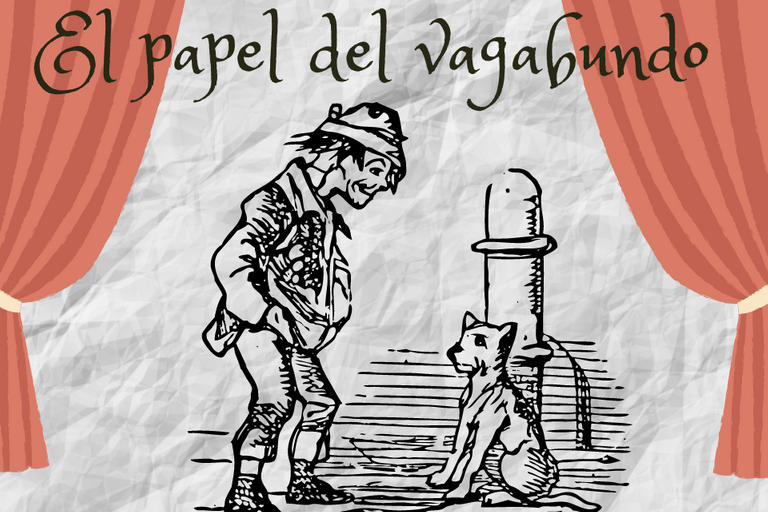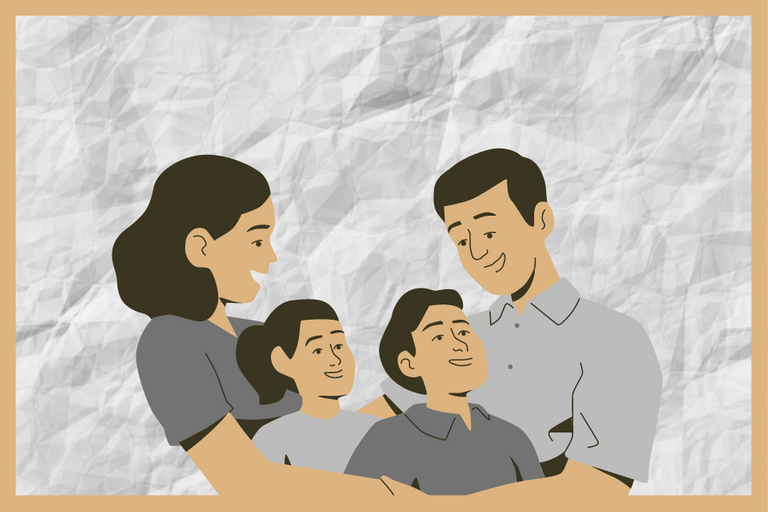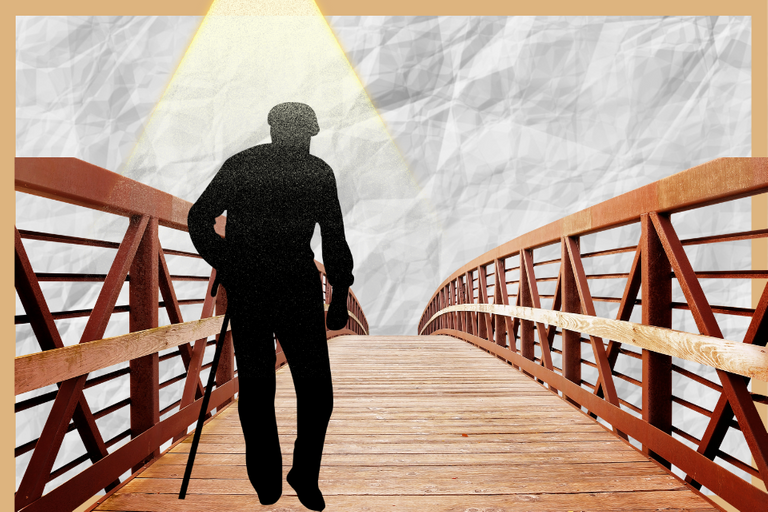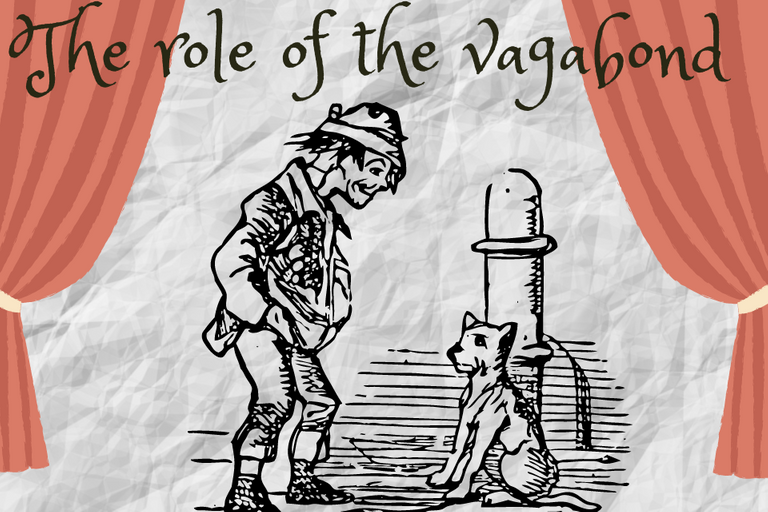
Portada diseñada con recursos de Canva

John caminaba sin rumbo por las calles de la ciudad de Madrid, llevaba una mochila en la espalda, un bastón en la mano, sus ropas estaban sucias y rotas; su pelo y barba era un completo desgreño. No tenía hogar, ni familia, solo una vecina llamada Deva, quien le ofrecía su ayuda de vez en cuando. Él era feliz cuando veía a Deva, puesto que ella era la única que no la veía con lástima y siempre le preguntaba: ¿Amigo cómo estuvo tu día?, y charlaban por ratos. John vivía el día a día, sobreviviendo a base de mendigar y de la venta de cartones. A veces, no podía conseguir comida, pasaba hambre. Cuando hacía mal tiempo, dormía a la intemperie. Era una vida dura, aunque no siempre fue así.
Hace 10 años, antes de que se convirtiera en un vagabundo, era un hombre con reconocimiento social y tenía un trabajo estable. Se casó de muy joven con una hermosa mujer y tuvieron dos hijos. Construyó una familia feliz. Pero cierto día su esposa muere en un accidente y él se quedó a cargo de sus hijos. Luego de esa pérdida no se sentía capaz para criarlos solo, así que tuvo que pedir ayuda a su familia. Después empezó a sentirse muy avergonzado por no ser un padre dedicado a la crianza, así que se refugió en el alcohol. Por varios meses buscó ayuda profesional, pero no podía dejar de pensar en su esposa y en lo mucho que la amaba. Un día, después de una fuerte discusión con un hermano, se fue a vivir a la calle. Desde entonces no ha vuelto a ver a sus hijos.

Imagen diseñada con recursos de Canva
Cansado de caminar y enfermo por su vejez, pensaba en sus hijos y se preguntaba cómo serán ahora, pero en el fondo de su corazón sabía que no volvería a verlos nunca más. Entonces prefirió no pensar en ellos, porque le hacía demasiado daño. Ese día, después de revivir pensamientos del pasado que lo atormentaban. Se dijo a sí mismo: “Seguiré viviendo en la calle hasta que muera”. Luego se sentó a descansar junto a una fuente.
Cuando despertó vio que una mujer joven se le acercó y le ofreció agua. El vagabundo la miró con asombro. La mujer le dijo: “Me llamo María y he venido con el fin de ayudarte'' –Nadie puede ayudarme, ha pasado mucho tiempo, ya estoy viejo y solo espero el día de mi muerte. Respondió John algo molesto –He venido porque dentro de 24 horas vas a morir. Mi misión es ayudarte a cruzar el más allá. Respondió María.
El vagabundo quedó profundamente desconcertado y el corazón se le arrugó, él aún no estaba preparado para morir, tenía culpas que resolver. Sin embargo, decidió aceptar la ayuda de aquella mujer y juntos se fueron a un edificio que tenía una vista esplendorosa hacia la ciudad. John fue el primero en iniciar la conversación y dijo: que él merecía el dolor y la crueldad del mundo por haber abandonado a sus hijos y agregó que su existencia era insignificante. Por eso no entendía como el creador lo estaba ayudando antes de morir.
María dijo: “Es necesario intervenir en este caso”, así que le mostró imágenes de los hijos del vagabundo. Se veían alegres y con riquezas, ellos recordaban a su padre como amor y respeto. Nunca lo odiaron ni pensaron que los había abandonado, sino que simplemente había muerto.

Imagen diseñada con recursos de Canva
Después de esto, John sintió un gran alivio. María mencionó: “Tienes un alma de buen corazón, todo lo que has hecho es amar. Si te preguntas por qué tuviste que llevar esta vida es que tu papel en esta obra de teatro fue ser un vagabundo, tú elegiste y lo hiciste bien. Pero debes soltar tus recuerdos para que puedas cruzar al más allá sin ningún remordimiento o de lo contrario te quedarás aquí atrapado y vagando por la eternidad”. Al escuchar esto, John sintió alivio, aunque no sabía si creer del todo, pero el saber que sus hijos siempre lo amaron era suficiente.
Por último, John dijo que quería hacer una cosa antes de morir y era despedirse de alguien en especial. John fue a la casa de Deva, su vecina, y le dijo: “Estoy dejando la ciudad y quiero agradecerte por toda la ayuda que me brindaste hasta el final”. Deva casi no podía contener su tristeza, pero logró decirle a John que había sido un placer conocerlo y que su presencia en su vida y su barrio sería siempre recordada. Al despedirse. Deva le dijo. "Te extrañaré, mi amigo". John le agradeció sus palabras y se despidió de ella.
Después de aquellos sucesos, John murió y ese mismo día estaba preparado para cruzar el puente del más allá.

Imagen diseñada con recursos de Canva
Fin..
Esta es una pequeña historia donde el protagonista es un vagabundo y el mensaje que se busca transmitir es que todos los seres humanos tenemos muchos papeles en la vida, salimos de uno para ir al otro. La vida de un vagabundo es, por supuesto, muy diferente de la nuestra. No tiene un hogar, ni un trabajo, ni una familia. No hay nada que lo atasque a un lugar. Tampoco tiene posesiones, excepto lo que lleva encima. Vive al día de la caridad de los demás. A veces es difícil para nosotros, que estamos atados a nuestras rutinas y a nuestras posesiones. Entonces es mejor no sentir lástima cuando vemos a un vagabundo, más bien hacer que su papel no sea tan doloroso y comprender que a veces los que tenemos todo sufrimos más que ellos.


Cover designed with Canva resources
John walked aimlessly through the streets of the city of Madrid, carrying a backpack on his back, a cane in his hand, his clothes were dirty and torn; his hair and beard were a complete mess. He had no home, no family, only a neighbor named Deva, who offered him help from time to time. He was happy when he saw Deva, since she was the only one who didn't look at him with pity and always asked him: "Friend, how was your day," and they chatted for a while. John lived from day to day, surviving by begging and selling cardboard. Sometimes he couldn't get food, he went hungry. In bad weather, he slept outdoors. It was a hard life, but it wasn't always like that.
Ten years ago, before he became homeless, he was a socially recognized man with a stable job. He married at a young age to a beautiful woman and they had two children. He built a happy family. But one day his wife died in an accident and he was left in charge of his children. After that loss he did not feel able to raise them alone, so he had to ask his family for help. Then he began to feel very ashamed of not being a dedicated parent, so he turned to alcohol. For several months he sought professional help, but he couldn't stop thinking about his wife and how much he loved her. One day, after a fierce argument with a brother, he went to live on the street. Since then he has not seen his children.

Image designed with Canva resources
Tired of walking and sick from old age, he thought of his children and wondered what they would be like now, but deep in his heart he knew he would never see them again. So he preferred not to think about them, because it hurt him too much. That day, after reliving thoughts of the past that tormented him. He said to himself, "I will continue to live on the street until I die." Then he sat down to rest by a fountain.
When he awoke he saw a young woman approach him and offer him water. The homeless man looked at her in amazement. The woman said to him: "My name is Mary and I have come to help you'' -No one can help me, it has been a long time, I am already old and I am only waiting for the day of my death. I have come because in 24 hours you are going to die. My mission is to help you cross the beyond. Maria answered.
The wanderer was deeply disconcerted and his heart wrinkled, he was not yet ready to die, he had guilt to resolve. However, he decided to accept the woman's help and together they went to a building with a splendid view of the city. John was the first to initiate the conversation and said that he deserved the pain and cruelty of the world for having abandoned his children and added that his existence was insignificant. Therefore he did not understand how the creator was helping him before he died.
Mary said, "It is necessary to intervene in this case," so she showed him pictures of the wanderer's children. They looked joyful and wealthy, they remembered their father as love and respect. They never hated him or thought that he had abandoned them, but that he had simply died.

Image designed with Canva resources
After this, John felt a great relief. Mary mentioned, "You have a kind hearted soul, all you have done is love. If you wonder why you had to lead this life it is that your role in this play was to be a wanderer, you chose and you did well. But you must let go of your memories so you can cross over into the afterlife without any regrets or else you will be stuck here and wandering for eternity." Hearing this, John felt relief, though he didn't know whether to fully believe, but knowing that his children always loved him was enough.
Finally, John said he wanted to do one thing before he died and that was to say goodbye to someone special. John went to the home of Deva, his neighbor, and said, "I'm leaving town and I want to thank you for all the help you gave me until the end." Deva could hardly contain her sadness, but managed to tell John that it had been a pleasure knowing him and that his presence in her life and neighborhood would always be remembered. As they said goodbye. Deva said to him. "I will miss you, my friend." John thanked her for her words and said goodbye to her.
After those events, John died and that same day he was ready to cross the bridge to the afterlife.

Image designed with Canva resources
End.
This is a little story where the main character is a tramp and the message is that all human beings have many roles in life, we leave one to go to another. The life of a homeless man is, of course, very different from ours. He has no home, no job, no family. There is nothing to tie him to one place. Nor does he have possessions, except what he carries on his person. He lives from day to day on the charity of others. Sometimes it is difficult for us, who are tied to our routines and our possessions. So it is better not to feel pity when we see a homeless person, but rather to make their role not so painful and to understand that sometimes those of us who have everything suffer more than they do.
¡THANKS FOR VISITING MY BLOG!

Baneer hecho en Canva | Baneer made in Canva






